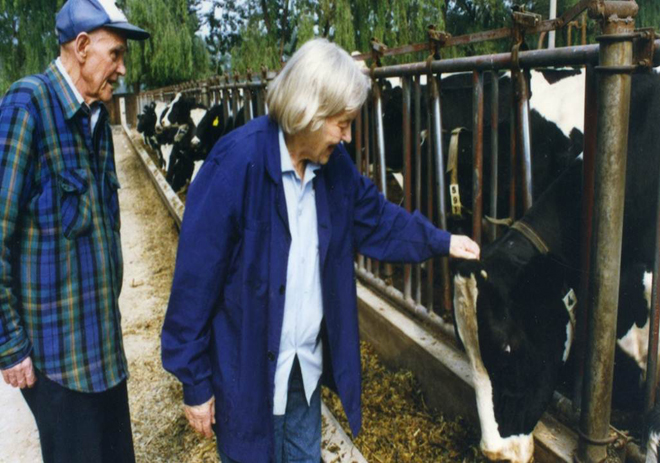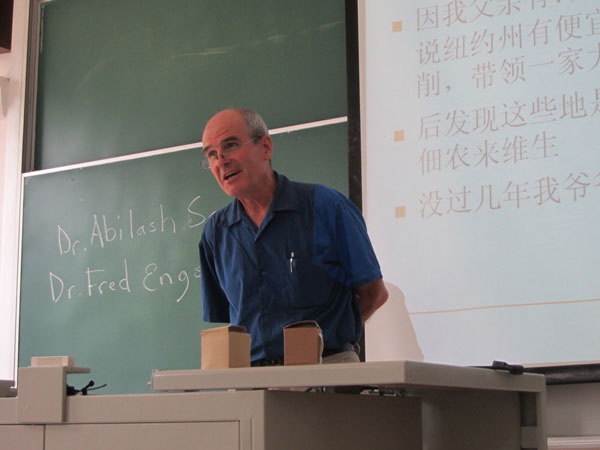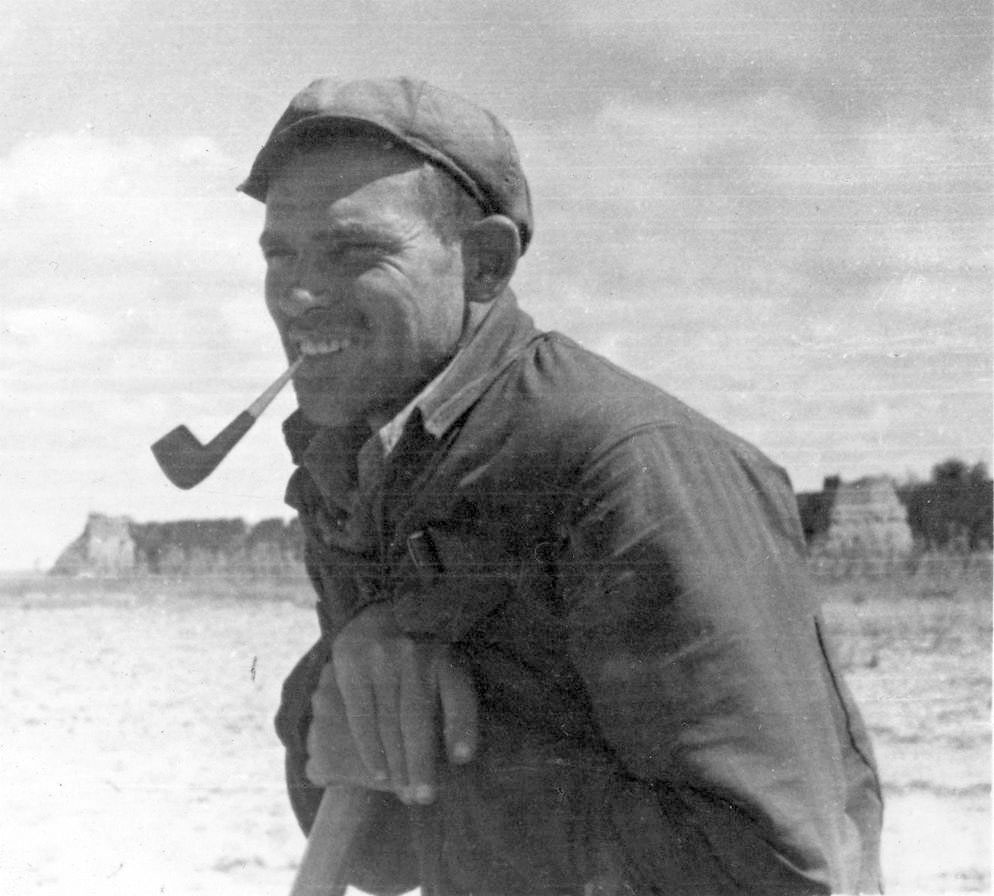Dr. Fred Engst, whose Chinese name is Yang Heping (阳和平), is the eldest son of Erwin (Sid) Engst and Joan Hinton, widely known as Yang Zao Han Chun (阳早寒春) in China, the country where the legendary American couple lived most of their lives as dairy farmers and are fondly remembered for their contribution to China’s dairy farm mechanization and cattle optimization. Dr. Engst, who was invited as a guest speaker by Dr. Mark Levine to share his family stories at Peking University, revealed to his audience rare facts about his parents and how he, a self-styled “red diaper boy”, thinks of the Communist China where he grew up.

Sid (阳早) and Joan (寒春) with their cows in Beijing. Photo: Courtesy of Dr. Engst
Dr. Engst, in Levine’s words, “grew up as a Chinese farm boy outside the city of Xi’an (西安)”. Born and bred in China, he left in the 1970s to study in the US where he “got his PhD, and taught at schools” for a period of 30 years. However, he “never felt fit in”. So he “came back home to China” in 2007 and is now teaching at the University of International Business and Economics in Beijing.
As the second guest speaker that day, Dr. Engst had only about 50 minutes to talk, which he mostly devoted to one question, which is also the question that gets asked most by people who know about his parents’ story, “Why did they come to China?”

Dr. Fred Engst during his speech at Peking University on May 22, 2013. Photo: sino-us.com
A devout communist
Dr. Engst’s version of his father's reason to come to China was genuine and concise, contrary to the rhetoric used in many reports written in Chinese. Sid Engst, who came from a modest working family background, first studied medicine at the University of Illinois and discovered he did not like his major. So he went to study agriculture at Cornell University where he met writer William Hinton, known as Han Ding (韩丁) in China, brother of Joan Hinton, the nuclear physicist who later became his wife. From Hinton, who had been to China in 1937, Sid learned about the famous book Red Star Over China and was fascinated by the book and the country it depicts: China.
The appeal of "millet plus rifles" (小米加步枪) with which the Chinese Eighth Route Army (八路军) led by Mao Zedong and the Chinese Communist Party fought the War of Resistance against Japan proved to be overwhelming to young Sid, who was already pro-communist at that time despite the strong anti-communist propaganda in the US, because he saw the sharp contrast between the booming economy of the Soviet Union as opposed to the Great Depression in the US. Determined to fight against the Nazis, he sold his cows which he loved with the intention of joining the army.
The World War Ⅱ ended soon after he had sold all his cows. Unwilling to become a soldier during peace time, he gave up his original plan and accepted the offer of the United Nations Relief and Rehabilitation Administration and came to China as a dairy specialist in 1946.
 "Other than the nose, doesn’t he look like a Chinese farmer?" quipped Dr. Engst while showing this picture of his father in Shaan Bei (陕北 north Sha'anxi province) in 1949. Photo: Courtesy of Dr. Engst
"Other than the nose, doesn’t he look like a Chinese farmer?" quipped Dr. Engst while showing this picture of his father in Shaan Bei (陕北 north Sha'anxi province) in 1949. Photo: Courtesy of Dr. Engst
What he saw in Changsha (长沙) which was then under the rule of Kuomintang (KMT, the Chinese Nationalist Party 国民党) was shocking. He realized that what China needed was not milk, but grain. Yet what the UN was trying to do was simply to dump excess US agriculture products on the world market. Sick of what he was seeing under the corrupt KMT government, he decided to go to Yan'an in north China which was the base of the Communist Party. In Yan'an he was deeply touched by a different world, where though everyone was poor, they were equal, upbeat and full of hope.
What really made him a devout communist and loyal supporter of Mao Zedong was his experience with the Chinese Communist Party's successful defeat of the invading KMT army led by Hu Zongnan (胡宗南) in 1947, which was 10 times the number of CPC’s People’s Liberation Army. With the help of the CPC, Sid managed to transfer his 30 something cows with him to safety time and again during the 400 days of confrontation, evading the KMT army all the way, who, despite having the advanced American-supplied air planes and radio tracking equipment, never managed to find them. The feat confirmed Sid’s belief in the CPC. "Trusting the Party" became his motto ever since.
 |
| Touched | Sympathetic | Bored | Angry | Amused | Sad | Happy | No comment |
Rhythm Media Group is a multi-media company, operating a US-based Chinese daily newspaper, The China Press, and the paper's website - uschinapress.com (which has mobile-app version), as well as a Beijing-based English website Sino-US.com. The group boasts 15 branch offices across the US, and a number of cultural centers focusing on culture-related business in the North America, Chinese mainland, Hong Kong and Taiwan.Launched in September 2012, the Sino-US.com is designed to serve as a bridge between China and the US, and to keep its readership inside or outside China better informed by providing news and insights on China's current affairs, culture, life, business, people and sports.
|
|